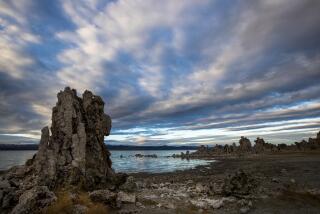DWP’s Terrible Case of Mono : Mayor Riordan works to bring city water policies into the modern age
The train known as the Mono Lake issue has been roaring down the tracks toward Los Angeles for 16 years. Yet the Department of Water and Power just stood there. Now, predictably, it has been run over.
In a move with profound implications for Los Angeles’ future, the state Water Resources Control Board has offered a proposal to restore the ecologically devastated Sierra lake 340 miles to the north that supplied about 15% of the city’s water, for half a century, until a state court halted diversions five years ago.
The proposal, if approved by the board Wednesday as expected, will mean Los Angeles would lose all Mono Lake water for 20 years or more, until the lake rises enough to restore its unique ecological balance. Los Angeles ratepayers would also have to spend millions to repair damaged trout streams in the Mono basin.
This result has been obvious for years. Yet the DWP, haunted by the ghost of William Mulholland, refused to see that times had changed. The DWP litigated, and lost, at every step, refusing compromises that were much better than the solution the state is about to impose. And it passed up good opportunities to obtain alternative water sources.
Mayor Richard Riordan quickly saw the madness of all this when he took office last year. Along with Councilwoman Ruth Galanter, he pressured the DWP to negotiate with the Mono Lake Committee to use a special state fund to find replacement water. The only trouble was that the fund had dwindled from $60 million to $36 million by the time agreement was reached last December. Still, four excellent projects to reclaim treated waste water are being mounted.
While arguing that the state plan goes too far, the DWP has sensibly decided not to fight the proposed lake level. However, it will dispute the costly stream-restoration plans as overkill.
The mayor is basically right. It is time to give up the Mono Lake battle, to move on and try to replace the lost water with reclaimed water and through conservation. The Metropolitan Water District says it can make up for much of the loss. But the possibility of more drought, federal and state requirements to increase fresh-water flows to repair environmental damage in the Sacramento Delta and other uncertainties mean the city should not lean too heavily on this old, reliable source, the MWD.
As ever, water is the future of arid Southern California. But what is needed at the DWP is not just more water, but more vision, leadership and courage.
More to Read
Sign up for Essential California
The most important California stories and recommendations in your inbox every morning.
You may occasionally receive promotional content from the Los Angeles Times.










